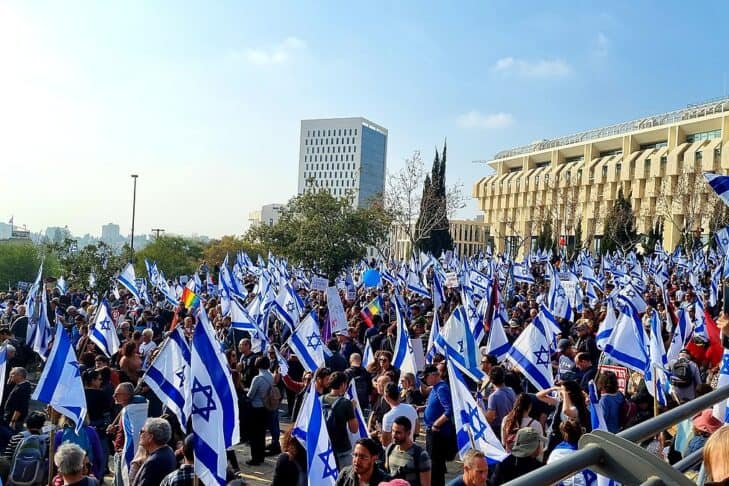A generation ago I spent a year in Israel on a post-collegiate volunteer program with about 50 other North Americans. Steeped in our privilege, we all deferred real life for a year while taking ulpan, volunteering in our sister cities, teaching English, and, for the lucky ones, harvesting potatoes in the deep Negev for a few months. In an ordinary year that would have been a little more care-free; in this version of the story, however, the Second Intifada raged all around us.
The casual ease with which we ignored the reality of Israeli life under terrorism was remarkable. We worked in impoverished schools with Ethiopian and Azeri immigrants, lived alongside Russian and Argentinian olim in absorption centers, dropped in and out of development towns like saviors, named card games “Pigu’a” (terror attack), and had an escape clause ready to activate at a moment’s notice with our open-ended return tickets.
It’s still unnerving to some degree how we quasi-normalized our decision to stay in Israel while suicide bombers struck with increasing frequency and violence flared throughout the territories. We pretended that we didn’t know where the attack helicopters were popping off to over Ashkelon or what was just on the other side of the wall on Route 6 east of Netanya; as Nick Carraway may have said, we were casually sorry, and then we forgot. But I don’t mean this to be pejorative—our hearts were pure and we were young. I had a wonderful time and the experience was life-changing.
Of that group that spent the year together, some stayed in Israel forever, some came home and made aliyah later, but most of us simply came home. I won’t speak for everyone from that year, but I will assert that for the majority of that cohort, Israel remains at the center of our now middle-aged Jewish identities. And now speaking only for myself, who self-describes as a fairly center-right Zionist, it was not hard at all to make the case for Israel and defend her, teach classes about Israeli advocacy to hundreds of teens, and lead annual trips to Israel for the better part of two decades. I did this while affirming undying love and commitment to the Jewish state and casually blowing past her flaws.
During that time I’ve taken Route 443 through the West Bank to avoid Route 1, sidestepped Jericho on the way to Ein Bokek, and driven that same seam route up the Green Line on Route 6. All of the otherness felt and still feels just out of reach, just beyond the horizon; I’m exceptionally good at looking straight ahead.
However, it’s impossible to avoid the uncomfortable parts of Israel when you can’t take a road to avoid them. The fault lines in Israel proper between secular and religious Israel, between those who serve in the army and those who do not, between those who work and those who live off the state, and between those who value Israel’s democratic identity over its Jewish identity (and vice versa), are ever more visible, and the seismic activity on those faults has never been greater. There are earthquakes on a daily basis, and just like Moses had to self-exclaim that he had to turn aside to behold the burning bush in Sinai, it’s high time we all realized that it’s time to turn aside and stare at another burning item—the-only-democracy-in-the-Middle-East’s unrepentant march toward self-immolation at the hands of the current government.
This goes way beyond not looking too closely at Tulkarem or Kalandiya and requires a dead-eyed reflection on the madness that is tearing Israel apart. Featuring a governing coalition set on removing judicial review of legislation, installing a twice-convicted criminal as a minister, legalizing bribery and corruption, the last few months have been a cornucopia of dysfunction, deceit, and anti-democratic debauchery on behalf of the government. Not enough for you yet? How about Yair Netanyahu accusing the U.S. State Department of funding the anti-coalition protests? Or Bibi firing, then un-firing, his defense minister, who spoke out against the reforms? Against this backdrop of chaos and nihilism, the government is hoping, no, it is praying, for the apathy that American Jews have so reliably presented when faced with Israel’s flaws.
Luckily, our response, once measured, has become more strident. And while the ire of diaspora Jewry has never been known to carry too much weight with the Israeli right, it was impossible for the coalition to ignore hundreds of thousands of Israelis taking to the streets, reserve pilots refusing to report for training, labor unions striking, and business leaders taking their capital out of the country. Faced with unprecedented protest, the government retreated, but only temporarily; make no mistake—the process is still very much on the rails. While it has been paused by King Bibi and his power-at-any-price coalition, it is poised to resume at the drop of a hat, hence the ongoing demonstrations that continue on a weekly basis.
Bibi’s no fool. He knows that eventually people get tired of protesting and that the world’s attention can only hold for so long, even on raging conflict—we have a terrible tendency to casually normalize just about anything. And that’s not a cynical take; consider Ukraine fatigue, and Russian war crimes that continue unabated and unpunished, the under-reported chaos in Sudan and across Africa, Bashar al-Assad’s rehabilitated image, and our complete numbness to gun violence. Eventually, we look away. Always.
To save Israel, we dare not.
This post has been contributed by a third party. The opinions, facts and any media content are presented solely by the author, and JewishBoston assumes no responsibility for them. Want to add your voice to the conversation? Publish your own post here. MORE



